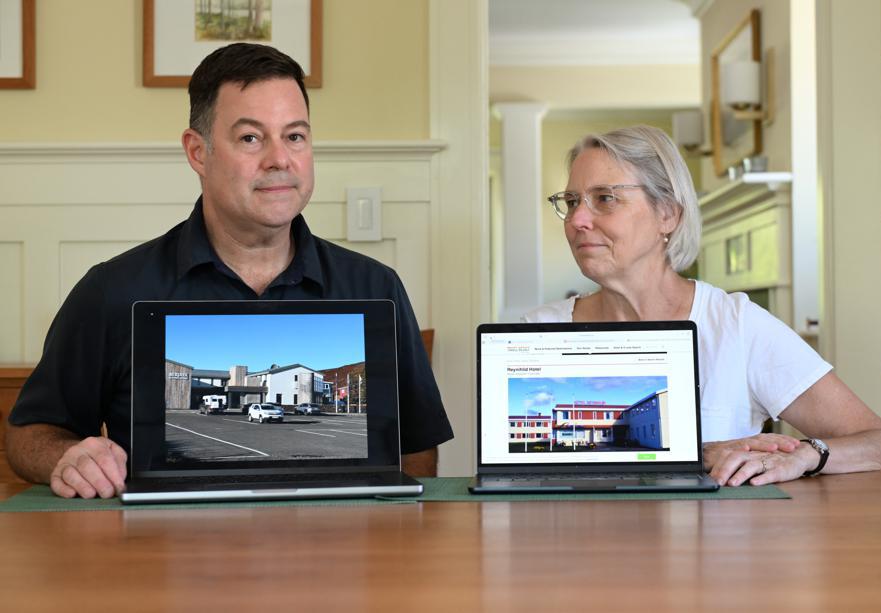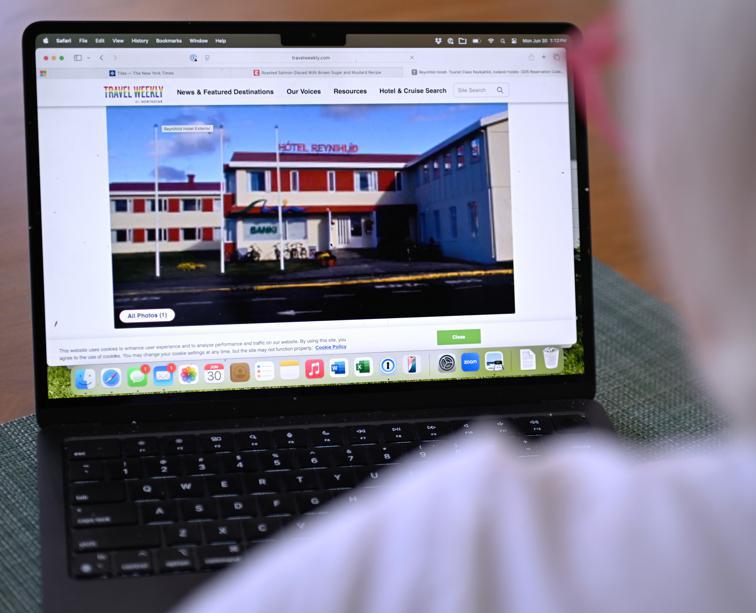

To celebrate their 30th wedding anniversary last year, Nancy Rhoads and Adam Glick decided to fly to Iceland, rent a car, and spend the next two weeks together driving around an island of barren beauty.
It was breathtaking — glaciers, volcanos, waterfalls, the Northern Lights (and not a lot of people) — a welcome antidote to the hustle and bustle of their everyday lives back in Boston.
“It felt like a total escape,’’ said Glick.
But when the time came to check into one of their hotels, they ran into a problem. The hotel they booked — and paid more than $600 to — didn’t exist.
On Sept. 21, as they toured northern Iceland, the couple opened their Capital One app, scrolled through the hotel listings on the travel page, and booked a room at what was listed as Hotel Reynihlid, located near Lake Myvatn.
With a couple of taps, they reserved the room for a two-day stay and paid for it ($613) on their Capital One account. To get there, they followed their GPS, but the location dot on the GPS kept moving, and it soon became apparent there was no Hotel Reynihlid to be found.
The couple spotted another hotel, called Hotel Berjaya, and pulled into the parking lot. Glick went in and told the receptionist he was looking for Hotel Reynihlid. It doesn’t exist, he was told. Glick returned to the car, where he and Rhoads opened their Capital One app and resumed their search for lodging. They liked the description of the nearby Fosshotel, which promised dramatic views of the lake from a high bluff.
After settling in at Fosshotel, Rhoads called Capital One customer service, reported what happened, and requested a refund. Customer service told her to call back in 24 hours. She did, but Capital One said it was still investigating.
“We’ll call you back,’’ the customer service representative said.
That didn’t happen, and the couple let it go while enjoying the rest of their vacation. In late September, they returned to their home in Arlington, feeling happy and refreshed.
But a couple weeks later the $613 charge for Hotel Reynihlid showed up on Rhoads’s monthly bill. The couple initiated a dispute and got a temporary credit while Capital One said it was contacting “the merchant’’ for its side of the story.
Ultimately, the refund was denied because, Capital One said, it had been assured by “the merchant’’ that “the goods were as described and received in good condition.’’
“We consider the case to be closed,’’ the giant financial services company, which has almost $500 billion in assets, wrote to Rhoads.
Rhoads and Glick, longtime Capital One cardholders, were bewildered. How could Capital One get that kind of assurance from a hotel that, to the best of their knowledge, didn’t exist?
The couple put a lot of effort into trying to convince Capital One it was mistaken, even writing to the chief executive. Their case seemed strong: Capital One knew the couple stayed at Fosshotel on the two nights in question, because they paid for it ($800) with their credit card.
Did Capital One really believe they booked two hotels for the same two nights and never showed up at one of them? Did Capital One not believe Rhoads when she promptly called to report they couldn’t find Hotel Reynihlid and was told it didn’t exist?
Rhoads told me she considered $613 to be a lot of money, but at some point in the months-long dispute she felt her integrity was being questioned. “I felt like I was being called a liar,’’ she said.
Finally, Glick wrote to me asking for help.
A week later, Capital One relented, calling Rhoads to say it was refunding the $613 charge at Hotel Reynihlid and, as a courtesy, the $800 charge at Fosshotel.
Why? Capital One told Rhoads it discovered the hotel where the couple first made their reservation had changed its name to Hotel Berjaya — the place Rhoads and Glick stopped as they searched for their missing hotel. Despite the name change, Capital One had continued listing it as Hotel Reynihlid. (It has since been removed.)
But I still couldn’t figure out why the receptionist at Hotel Berjaya told Glick the Hotel Reynihlid didn’t exist. Wouldn’t the staff there know about the name change and figure the man making the inquiry at the reception desk was in the right place but with the wrong name? (In fact, Berjaya had their reservation.)
I asked Capital One about the timing of the name change but it declined to say. Then, I got a stunning reply to an email I sent to Hotel Berjaya. The name was changed when Hotel Reynihlid was bought — in 2017.
It seems plausible the receptionist to whom Glick talked was unaware that Hotel Berjaya was a successor to a hotel called Hotel Reynihlid because seven years had passed. He would have no compelling reason to check for a reservation based on the hunch Glick had the wrong name.
The general manager told me he was the only current employee who worked there back when it was Hotel Reynihlid. (He also confirmed Hotel Berjaya had the couple’s reservation, but marked them as “no shows.’’)
I don’t know when Capital One discovered its mistaken listing. In a statement, Capital One said it regretted that the couple’s experience “fell short of expectations.’’
Corporations don’t always do the right thing. And they’re sometimes less than forthcoming.
Capital One apparently failed to properly update its travel page. Rhoads and Glick relied on that page. When Rhoads first demanded a refund, Capital One should have discovered its mistake, corrected it, and made Rhoads whole.
Instead, it gave her the runaround.

